News | Thursday, 19 February 2015
Science needs an open-minded atmosphere
The Alliance of Science Organisations in Germany is calling for the country to remain an open, tolerant and international centre for research

The current debate on immigration and asylum in Germany is agitating society, saturating the media, and demanding a response from politicians. Aside from the fact that immigration is necessary for countries faced with an aging population, the issue has a particular resonance for science as it is, and always has been, an international field. The Alliance of Science Organisations is therefore calling for a concerted effort to ensure Germany remains an open, tolerant and international centre for research.
Scientific knowledge knows no national boundaries, and ideas that arise from people of other cultures, religions and nationalities promote creativity. Over 300,000 people currently studying in Germany come from abroad, and German scientific organisations fund over 56,000 international researchers who are enriching the country’s scientific knowledge and teaching with their experience and ideas. Germany’s high international regard can only be maintained if researchers from all corners of the world feel that they and their families are welcome and will receive the necessary support wherever in the country they are. This is something that scientists and politicians have already been working together very effectively to achieve.
The Alliance of Science Organisations in Germany is a union of the most important German research organisations. It regularly issues statements relating to research policy and funding and the structural development of the German research system. Members of the Alliance include the Alexander von Humboldt Foundation, the German National Academy of Sciences Leopoldina, the German Academic Exchange Service, the German Research Foundation (DFG), the Fraunhofer-Gesellschaft, the Helmholtz Association of German Research Centres, the German Rectors’ Conference (HRK), the Leibniz Association, the Max Planck Society, and the German Council of Science and Humanities (Wissenschaftsrat). The member societies take turns to preside over the Alliance, and the Max Planck Society is its head in 2015.
